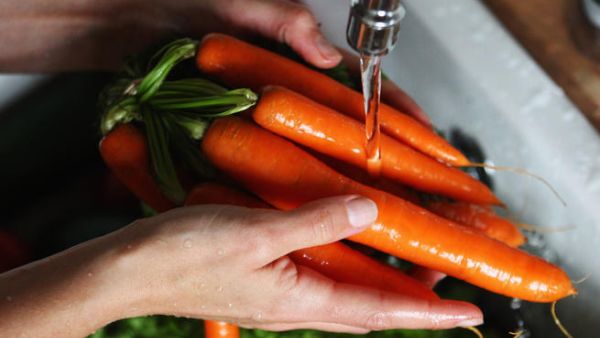Germs thrive all around us "even on us" and how we minimise their attack is dependent on how we take care of ourselves and our surroundings, especially those involved with food. The recent E. coli scare in Europe has yet again reminded us how important personal hygiene, and thoroughly cleaning everything we consume is, as the source of the sickness is still uncertain and new strains are being discovered every other day.
Dettol’s Habit (Hygiene: Attitudes, Behaviour, Insight and Traits) study, conducted in various countries including the UAE and Saudi Arabia, found that people who have good hygiene habits (such as effective hand washing and household cleaning) and good manners (such as covering your mouth when sneezing or coughing) are almost two and a half times more likely to have good health and be less prone to infection.
Responsible living
“Previous studies have shown that intensive hygiene education plus the regular use of disinfectants (soap, surface cleaner, and skin disinfectant) can significantly reduce the risk of illness among children,” says Tariq Madani, professor of medicine and infectious diseases, faculty of medicine, King Abdulaziz University, Jeddah.
He was in Dubai recently for a seminar organised by the Hygiene Council.
“These new findings from the Habit further emphasise how improved hygiene behaviour can effectively stop the spread of germs. Practising good hygiene is not just the concern of women, more conscientious people or those who live in a dirty environment; it is everyone’s responsibility and is vital in breaking the chain of infection” he adds.
How then can we create a cleaner home environment?
“Regular disinfection of frequently touched surfaces, particularly kitchen surfaces and taps, is essential. Many disinfectants are available for household disinfection. However, it is better to use the well-known brands. Bleach is acceptable but it has to be diluted at least ten times with water before using it to disinfect surfaces. The bleach solution needs to sit on the surface to be sanitised for about ten minutes to be effective,” Madani says. He also said disposable cleaning implements are better. “The use of disposable mops and scrubs is indeed preferred over reusable ones, particularly when used to clean or disinfect kitchen surfaces where food is handled or served. If reusable mops and scrubs are used they have to be frequently washed and disinfected.”
After minimising germs from the surfaces, how can we reduce, if not eliminate, contamination from food?
“Washing fruits and vegetables is important whenever you cook. You have to check the quality and segregate the good items and dispose the bad ones,” says Sous Chef Black of Radisson Blu Dubai Media City.
Sanitising solutions
“While washing fruit or vegetables, never wash and sanitise different types of fruit or vegetables together. It always should be one type at a time. First, wash them, removing all visible dirt and check for worms or other pests, then wash properly. Second, transfer the washed fruit or vegetables in another bowl or sink with water using sanitising solution. Make sure that it is completely immersed in the solution and let stand for five minutes. Fill another bowl or sink with water. Ensure it is clean for final rinse. Immerse and rinse the produce properly. Let it stand for at least five minutes in a strainer to drain the excess water.”
Speaking of sanitising solutions, are they really effective or just marketing gimmicks?
“The off-the-shelf washes/tablets may rid fresh produce of most bacteria, but water works just as well. Water can remove 98 per cent of bacteria when it’s used to rinse and soak produce. Rinse under running water. For extra protection, adding one part vinegar or lemon juice to three parts water helps, but you don’t need to use any soap, detergents or special cleaners. Rinse food, even if you are going to peel it. Use a scrub brush to remove additional dirt and bacteria. Dry produce with a clean cloth or paper towel to wipe off more bacteria,” Madani says.
Nils Al Accad, CEO, Organic Foods & Café, feels “they are effective for cleaning bacteria, on the surface but they do not remove pesticides that have soaked into the plant or fertiliser that is drawn up through the roots”, which may have been the case in the E.coli scare. So is it safer to buy organic food only?
“No. Let’s wait to get the full facts,” Al Accad says. “Did you know there is E. coli on a lot of food we eat? It is just in small doses and not a dangerous strain. The key issue is, you have to see if the recent incident is linked to organic farming practices or not. The fact is, this could have happened in conventional farming in the same way. The latest information I have says this was not from cow manure and maybe from water and in this case the issue is that it is a new strain of E. coli that probably mutated.”
Professor Tariq Madani’s kitchen hygiene tips are as follows:
- Wash hands frequently with disinfecting soap before preparing food, particularly when you intend to handle food items that are served uncooked such as salad and fruits. Hands should also be washed after touching raw food, especially meat, and after going to the toilet.
- Never use the same chopping board or utensils for raw meat and ready-to-eat food without washing the board and knife thoroughly in between.
- It is especially important to make sure poultry, burgers and sausages are cooked all the way through.
- Make sure you keep your fridge temperature at less than 5°C and your freezer at less than -18°C.
- Store fresh and frozen food in the fridge or freezer as soon as possible after you have bought it. This is especially important when the weather is hot.
- Keep raw meat and seafood separate from other foods. Store raw meat in an airtight container at the bottom of the fridge to prevent juices or blood dripping on to other food.
- If you’re keeping cooked leftovers, allow them to cool to room temperature before you store them in the fridge. Make sure you use up any leftovers within two days.
- Throw away food that has passed its use-by date.
By Manjari Saxena








